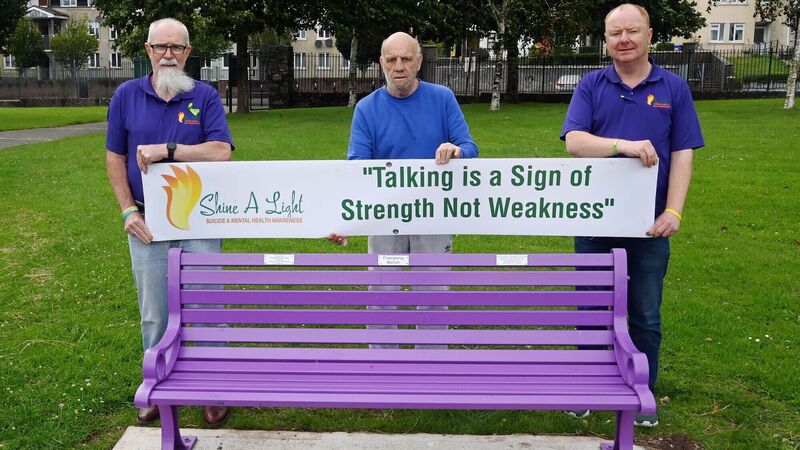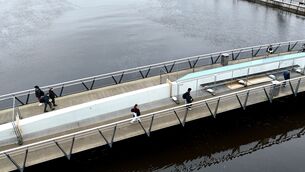Cork charity calls for more funding to help address mental health issues

Joe D’alton (left), with Tom “Golly” Flynn (centre), and Mick Nugent of Shine A Light Suicide & Mental Health Awareness at the friendship bench initiative at Gerry O’Sullivan Park, Churchfield/Gurranabraher. Picture Denis Minihane.
A Cork charity is calling for greater funding for mental health services, and greater focus on reducing suicide levels, as they say real-life issues like the cost of living and a housing shortage are having an impact on the mental health of people in Cork city.
Shine A Light Suicide & Mental Health Awareness was set up in 2009 in response to a series of suicides that deeply affected the community on the northside of the city.
The 2025 health budget sees spending on mental health rise to almost €1.5 billion, the fifth consecutive year that an increase in funding has been provided, representing an increase of 43.7% over the lifetime of the last government.
However, funding for mental health in Ireland still only represents 5.8% of the total health budget. The Organisation for Economic Co-operation and Development (OECD) recommends that countries should allocate approximately 10% to 12% of their total health spending to mental health services. The Government’s own health programme, Sláintecare, also commits to ringfencing at least 10% of the health budget to mental health.
Under resourced
Mick Nugent, vice chairperson, and Joe D’Alton, administrator, of Shine a Light told The Echo that securing adequate funding for mental health services is difficult, and that their service is “under resourced”.
Mr D’Alton said: “The amount of money coming in from the budget allocation shows that mental health is the poor relation of the Department of Health’s overall budgeting.
“But where is that going to go? How is it filtered down to the likes of us? We do get funding for some of the work we do, that money is given out to voluntary groups and NGOs to do the work for them.”
He explained that the money is granted on a case-by-case basis rather than allocated to groups to spend as they need.
“I’ve just finished a funding application for the national lottery fund through the HSE.
“We applied for two projects we want to do this year, because you have to spend it within the year,” he explained.
Projects they hope to fund through these grants include mental health workshops to be delivered in schools and youth groups, with Shine a Light having run 10 of these workshops in 2024.
The group also offer counselling services at low cost, but the running of this is mostly funded by the public.
Funding
Mr Nugent said: “We apply for grants for different projects, but mental health services really should have multi-annual funding.”
Mr D’Alton added: “This applies to all voluntary groups, there’s no long term funding, it’s on an annual basis and there’s always a shortfall.
“We’re a small voluntary group in the city, there’s 13 of us here, everybody puts in lots of their own time and we are making a huge impact on the ground. Whatever bit of funding we get, the Government get big bang for their buck.
“We’re a community-driven group, we came about because of a spate of suicides in the northside of the city and people came together because they wanted to do something.”
Mr Nugent added: “Several groups like ours appeared after clusters of suicides in communities, there was a gap there in communities that the community itself had to organise a response,” adding that HSE community health workers were involved from the start in several of these groups, particularly Shine a Light.
“Either there were gaps there or people in communities didn’t know where to look to find that help.”
Since they set up Shine a Light in 2009, they have dealt with significant challenges and increasingly complex cases, including people who have both mental health difficulties and intellectual disabilities, or both mental health difficulties and addiction issues.
“We know people that have been turned away from mental health services due to addiction issues,” said Mr Nugent.
Mr D’Alton said: “To get into those services, you have to be clean and sober, but how do you get clean and sober?”
They have also supported people under the age of 18 who were in need of help but at risk of ageing out of eligibility for Camhs due to the length of waiting lists.
Increased demand
Increases in the cost of living have also led to an increased demand for mental health support, they said.
Mr Nugent explained: “Mental health challenges are prevalent across all demographics, but at the same time we were born out of a primarily working class area, there are still levels of inequality and poverty and challenges there.
“Real life issues have real life effects. Housing definitely is a big thing for people trying to cope and young families in particular.
“Things like good living environments, stable housing, access to services and schools can have a positive effect. Some people can be very comfortable and still have mental health issues but we know not having stable living conditions and dealing with those challenges can have a negative effect on mental health.”
Mr D’Alton said: “The data is there to prove that mental health issues are more prevalent in under-privileged communities.”
Having a dedicated service on the northside of Cork city was important for this reason, he said, but also highlighted the importance of all voluntary mental health service providers. “If our service, and bigger places like Pieta and Samaritans weren’t there, Ireland would be crumbling.”
Advocating
They have been advocating for improvements to HSE run mental health services for years, including campaigning for the creation of a designated safe area for patients presenting with mental health issues separate from Emergency Departments, arguing that the “chaotic and high-stress atmosphere” of EDs can increase a person’s anxiety and lead to them leaving the hospital while waiting to be seen or treated.
As well as more funding and reforms to acute services, more attention is needed on mental health issues and suicides from the government, the group believe.
Mr D’Alton said: “Deaths on the road are getting more priority, and every death is important. But, in a year 500 people in Ireland die by suicide — that’s more than the capacity of a jumbo jet. Each and every one of them has a family that’s impacted.
“There’s an exponential mental health problem here. Coming down the tracks, Ireland is heading for a tsunami of mental health problems, and I don’t know how the Government are going to sort it out.”







 App?
App?


